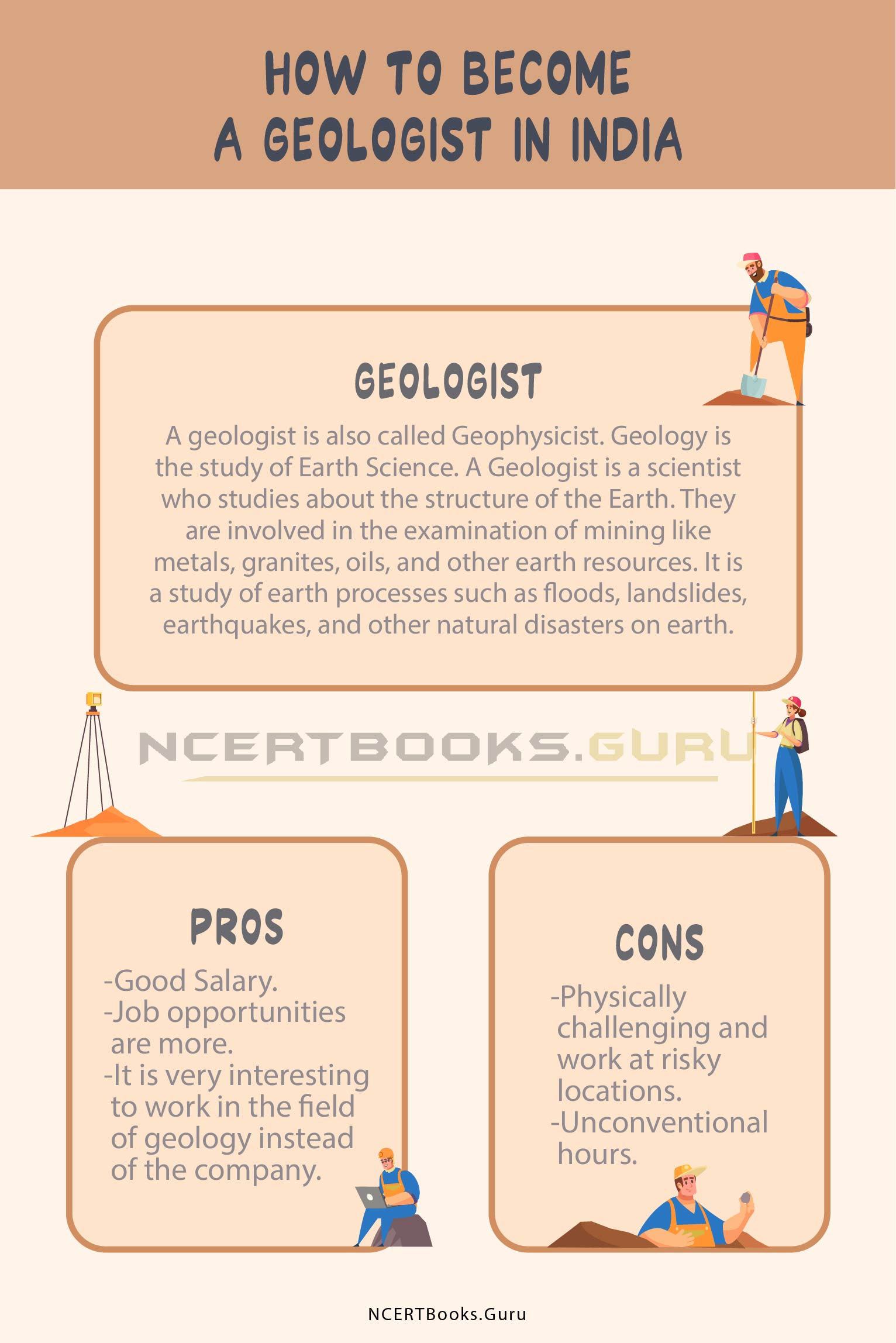Employment for geoscientists has a lot of demand in India. Every year approximately 3000 candidates will be selected for the post of geologist in different job roles. So, this is the best time to make your career as a geologist in India. But you people may have a doubt that how to become a geologist in India?
If you are interested to become a geologist in India we will help you out by providing the guidelines regarding eligibility criteria, course details, subjects to read, skills required, study material, salary, responsibilities of a geologist in this article.
- Geologist
- Eligibility Criteria to Become a Geologist in India
- What to Study to Become a Geologist in India?
- Geology Course Details with Fee Structure
- Subjects to Study in Geology
- Top Colleges/Universities that Offers Geology Courses in India
- Skills Required to become Geologist in India
- Top Recruiting Companies for Geologist Post
- Top Job Profiles for Geologists in India
- Study Material to Become Geologist
- How to Become Geologist in India?
- Responsibilities of a Geologist in India
- Salary for Geologist in India
- Pros & Cons of Becoming a Geologist in India
- What qualifications do you need to be a geologist?
- Can a geologist work in ISRO?
- What type of geologist makes the most money?
- Can I do Geology after BCOM?
Geologist
A geologist is also called Geophysicist. Geology is the study of Earth Science. A Geologist is a scientist who studies about the structure of the Earth. They are involved in the examination of mining like metals, granites, oils, and other earth resources. It is a study of earth processes such as floods, landslides, earthquakes, and other natural disasters on earth. The main duty of a geologist is to understand the history of the planet, structures, materials beneath the earth.
Eligibility Criteria to Become a Geologist in India
To apply for the post of geologist the applicants must have to fulfill the eligibility criteria mentioned by the recruiters.
- Educational Qualifications: Students must take science at the 12th level with subjects such as maths, physics, and chemistry. And the candidates must have to score more than 60% marks from any recognized board. Take B.Sc in geology course in the bachelor’s course from any university. After completing the graduation course in the relevant course candidates can pursue postgraduation courses in the related field.
- Age limit: There is no age limit to apply for the post of a geologist.
What to Study to Become a Geologist in India?
The candidates who are in a thought to become a geologist must study any of the below-mentioned bachelor courses and postgraduate courses like B.Sc/B.A/M.Sc/M.Tech/Doctorate in relevant field.
UG Courses:
- Bachelor of Science (B.Sc) in Geology, Environmental Science, Earth Science
- B.Sc Hons. in Geology
- B.A in Geology, Environmental Science, Earth Science
PG Courses:
- Master of Science in Geology, Applied Geology
- M.Sc Hons. in Geology
- M.Tech in Geology, Applied Geology
Doctoral Courses:
- Ph.D. in Geology
Geology Course Details with Fee Structure
Before you select the type of course candidates must know the duration and fee structure. The fees will be varied based on the type and rank of the college. Go through the below table to know how much fee you need to pay for the particular UG/Diploma/PG course.
| Name of the course | Duration | Fee Structure per annum |
| Diploma | 1 year | Differs from college to college |
| Bachelor’s | 3 years | Rs. 10,000 to 1 lakh |
| Master’s | 2 years | Rs. 30,000 to 1 lakh |
| Doctorate | 3 years | Rs. 1 lakh to 2 lakhs |
Subjects to Study in Geology
Some of the subjects you need to study to become a geologist are Hydrogeology, structural geology, stratigraphy, paleontology, economic geology, petrology, mineralogy, etc.
Top Colleges/Universities that Offers Geology Courses in India
Here are some of the top colleges and universities all over India that offer Geology Courses. The students can select the college as per the rank scored in the entrance exams and 10+2 exams.
- Indian Institute of Technology, Bhubaneswar
- Indian Institute of Technology, Kharagpur
- University of Madras, Chennai
- Manipal University, Manipal
- Presidency College, Chennai
- Jain University, Bangalore
- St. Xavier’s College, Mumbai
- Hans Raj College, New Delhi
- Christ College Irinjalakuda, Thrissur
- University of Mumbai, Mumbai
- SRM University, Amaravati
- Tata Institute of Fundamental Research, Mumbai
- Indian Institute of Science Education and Research, Pune
- Indian Institute of Science Education and Research, Kharagpur
- S.S. Jain Subodh P.G. College, Jaipur
Also, See:
Skills Required to become Geologist in India
In addition to the educational qualifications, the aspirants must have the below-mentioned skills.
- A geologist must have good communication skills.
- Able to work in a team.
- Problem-solving skills
- He/She must analyze the data and understand it quickly and correctly (Analytical skills).
- Perceptual skills
- Good observation skills
Top Recruiting Companies for Geologist Post
The geologists are recruited by local, state, and central governments. Here are some of the top companies that recruit candidates who fulfill the eligibility criteria.
- Bharat Petroleum Corporation Limited (BPCL)
- Coal India
- Central Ground Water Board (CGWB)
- Indian Space Research Organization (ISRO)
- Indian Bureau of Mines (IBM)
- Geological Survey of India (GSI)
- Hindustan Zinc Ltd
- Minerals and Metals Trading Corporation (MMTC)
- Mineral Exploration Ltd.
- Oil and Natural Gas Commission (ONGC)
Top Job Profiles for Geologists in India
There are different types of jobs as a geologist they are as follows. Go through them and choose one according to your interest.
- Petroleum Geologists
- Earth Science Teachers
- Structural Geologists
- Engineering Geologists
- Volcanologists
- Environmental Geologists
- Glacial or Quaternary Geologists
- Hydrogeologists
- Paleontologist
Study Material to Become Geologist
To choose a career as a geologist you have to go through the best books that help you to pursue a geology course. Here are some of the books and study materials to become a geologist.
- A Dictionary of Geology – Morrison
- Geology: An Introduction – Kronaris and Krambine
- Geomorphology – Woolridge or Thornbury
- Principles of Petrology – G.W. Turrel
- Text Book of Geology – P.K. Mukherjee
- Text Book of Physical Geology – Mahapatra
- Underground Hydrology – David Leith Toad
- Annals of the former world – John McPhee
- The Story of Earth: The first 4.5 Billion Years, from Stardust to Living Planet – Robert M. Hazen
- The Sixth Extinction: An Unnatural History – Elizabeth Kolbert
- The Universe Within Discovering the common history of Rocks, Planers, and People – Neil Shubin
- The Wave: In Pursuit of the Rogues, Freaks, and Giants of the Ocean – Susan Casey
How to Become Geologist in India?
There are three steps to becoming a geologist in India. Follow the below-given steps to know how to become a geologist after the 12th.
- In order to become a geologist, the candidates should have completed their class 12 from any recognized board.
- Should have completed bachelor’s degree if possible master’s degree from any stream.
- Attend the personal interview and then you will be selected for the post of geologist.
Responsibilities of a Geologist in India
A geologist is a scientist who studies earth science. He/she is the one who extracts oils, minerals, mines from the earth. The roles and responsibilities of a geologist are given below.
- Examining the physical properties of the solid earth.
- Collaborating with the engineers at sites and collecting the data from them.
- Supervising site investigations and preparing the budget.
- Determining and locating places and presenting geological maps.
- Study of structure and characteristics of the earth.
- Estimate the quality and quantity of the minerals.
- Conducting research, documentation, and presenting to the authorities.
Salary for Geologist in India
The salary/pay scale of Geologist in India are shown in the below table in three stages one is as a fresher, 2 to 3 years experience, and senior-level employee.
| Job profile | Initial Salary per annum | Mid Level Salary | Senior Level Salary |
| Geophysicist | Rs. 2,95,000 | Rs. 6,50,000 | Rs. 24,20,000 |
| Geologist | Rs. 2,25,000 | Rs. 4,93,000 | Rs. 12,35,000 |
Pros & Cons of Becoming a Geologist in India
Candidates have to go through a lot after becoming a geologist. You have to work in different locations in a different atmosphere. There are both advantages and disadvantages of becoming a geologist.
Pros:
- Good Salary
- Job opportunities are more
- It is very interesting to work in the field of geology instead of the company.
Cons:
- Physically challenging and work at risky locations
- Unconventional hours

FAQs on becoming Geologist in India
What qualifications do you need to be a geologist?
- Knowledge of mathematics, physics, and chemistry
- Knowledge of geography
- analytical thinking skills
- excellent verbal communication skills
- knowledge of engineering science and technology
- the ability to come up with new ways of doing things.
Yes, Of course, you can work in ISRO as a geologist. There are many vacancies for a Junior Research Fellow in ISRO.
What type of geologist makes the most money?
The geologist working in the petroleum industry will get the highest salary.
No, you can’t study B.Com to become a geologist. You have to study B.Sc and M.Sc degrees in geology. A student from a commerce background cannot become a geologist.
Final Words
The details mentioned in the above article is information gathered from the experts. We wish the guidance regarding how to become a geologist in India is helpful for the aspirants. Keep in touch with us to get the latest updates on all scientist jobs. Leave your queries as the comments in the below-mentioned comment section we will respond as soon as possible.
